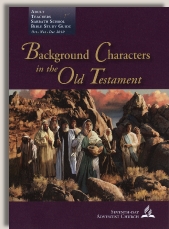|
||||||||||||||
Commentary on "Story and History"
Day 5: Wednesday, September 29, 2010 - Of Kings and Princes
Overview
The lesson gives a brief overview of the monarchy period of Israel’s history. It summarizes the reigns of Saul, David, and Solomon and ends with the instruction to read 1 Samuel 8:7-20 and then asks the question, “How often do we find ourselves doing the same thing, wanting to do things our own way instead of God’s?”
Observations
To be sure, Israel rebelled against God by demanding a king like the other nations. Samuel was hurt, feeling as if the people were rejecting him in wanting a king. God told him, however:
“Listen to the voice of the people in regard to all that they say to you, for they have not rejected you, but they have rejected Me from being king over them.”
Interestingly, God foreshadowed during the time of Moses that Israel would have kings.
“When you come to the land that the LORD your God is giving you, and you possess it and dwell in it and then say, ‘I will set a king over me, like all the nations that are around me,’ you may indeed set a king over you whom the LORD your God will choose. One from among your brothers you shall set as king over you. You may not put a foreigner over you, who is not your brother. Only he must not acquire many horses for himself or cause the people to return to Egypt in order to acquire many horses, since the LORD has said to you, ‘You shall never return that way again.’ And he shall not acquire many wives for himself, lest his heart turn away, nor shall he acquire for himself excessive silver and gold (Deuteronomy 17:14-17 ESV).
“And when he sits on the throne of his kingdom, he shall write for himself in a book a copy of this law, approved by the Levitical priests. And it shall be with him, and he shall read in it all the days of his life, that he may learn to fear the LORD his God by keeping all the words of this law and these statutes, and doing them, that his heart may not be lifted up above his brothers, and that he may not turn aside from the commandment, either to the right hand or to the left, so that he may continue long in his kingdom, he and his children, in Israel (Deuteronomy 17:18-20 ESV).
“The LORD will bring you and your king whom you set over you to a nation that neither you nor your fathers have known. And there you shall serve other gods of wood and stone. And you shall become a horror, a proverb, and a byword among all the peoples where the LORD will lead you away. You shall carry much seed into the field and shall gather in little, for the locust shall consume it. You shall plant vineyards and dress them, but you shall neither drink of the wine nor gather the grapes, for the worm shall eat them. You shall have olive trees throughout all your territory, but you shall not anoint yourself with the oil, for your olives shall drop off. You shall father sons and daughters, but they shall not be yours, for they shall go into captivity. The cricket shall possess all your trees and the fruit of your ground. The sojourner who is among you shall rise higher and higher above you, and you shall come down lower and lower. He shall lend to you, and you shall not lend to him. He shall be the head, and you shall be the tail (Deuteronomy 28:36-44 ESV).
Long before the time of Samuel, God established the fact that Israel would have kings. He told them that the kings were to individually copy the book of the law for themselves so they would have a personal copy of it to study all his life. Moreover, God told them that the day would come when they and their king would be send into exile under the control of pagan nations, and He told them how they would suffer. God told Israel through Moses that living in observance to His law would protect them from suffering, and He also warned them that the day would come when they would not honor Him but would be disciplined by captivity.
Israel’s first king was not from the royal tribe of Judah; Saul was a Benjamite. By this fact alone, if one paid attention to Jacob’s prophecy to Judah, that Saul would not be the king from whom the promised scepter over Judah would come:
Judah is a lion's cub; from the prey, my son, you have gone up. He stooped down; he crouched as a lion and as a lioness; who dares rouse him? The scepter shall not depart from Judah, nor the ruler's staff from between his feet, until tribute comes to him; and to him shall be the obedience of the peoples (Genesis 49:9-10 ESV).
Saul’s reign lasted 40 years, and his rule can be summarized thus: he had no heart for God.
David succeeded Saul, and interestingly, God allowed Samuel to anoint both Saul and David before his death. In other words, God used Samuel, the faithful prophet and priest who led Israel’s transition from the time of the judges into the monarchy, to see the beginning of the fulfillment of God’s promise to establish a throne over Judah that would have no end.
David was a warrior, and he captured Jerusalem from the Jebusites and established it as both his capital city and the religious seat of Israel. After capturing Jerusalem, David had the ark moved from the territory of the Philistines to Jerusalem where he established its permanent “residence”.
When David died his son Solomon took the throne. Solomon was the son of David and Bathsheba, the wife of Uriah the Hittite whom David had killed on the front line of battle after he discovered that his dalliance with Bathsheba resulted in her becoming pregnant. After David took Bathsheba as his wife and their baby was born, the baby died. Confronted by the prophet Nathan, David repented of his sin—but he still lost that baby.
Interestingly, however, he stated that the baby could not come back to him, but he knew he would go to where the baby was (2 Samuel 12).
In Solomon, God redeemed David’s great sin and blessed him and Bathsheba with the son through whom the eternal, royal king of Israel would come. Solomon, the offspring of the ill-gotten union between David and Bathsheba, became the royal heir in the lineage of Christ.
The monarchy of Israel was the most prosperous and powerful time in the nation’s history. Under David the nation grew, and under Solomon it became even more prosperous. Solomon, however, became compromised by his pagan wives, and as his life neared its end, he began worshiping their pagan gods.
The monarchy can be summarized this way:
Three kings reigned over the united monarchy. Each reigned 40 years—thus, forty–forty–forty. The first forty—Saul—had no heart for God. The second forty—David—had a whole heart for God. The last forty—Solomon—had half a heart for God.
Summary
- God foretold through Moses that Israel would have kings.
- God established a requirement for Israel’s kings: that they would copy by hand the entire book of the law so they would have a personal copy for the rest of their lives to study and know His will.
- God foretold that Israel would go into captivity with her kings as discipline for apostasy.
- Saul, not from Judah but from Benjamin, was not intended to be in the line of the promised eternal King.
- David was the first king from the line of Judah.
- Samuel, the one who transitioned Israel from judges to a monarchy, was allowed to anoint both Saul and David and thus be part of establishing the Line of David from the tribe of Judah through whom the Messiah would come.
- Solomon was the son of David and Bathsheba with whom David committed adultery and subsequently had her husband killed in battle.
- David repented of his sin, and God redeemed his sin by allowing him and Bathsheba to produce the one from whom the Messianic line would be established.
- The united monarchy period of Israel’s history was its most prosperous and expansive.
- The monarchy can be summarized thus: Forty-forty-forty. Saul—no heart for God. David—a whole heart for God. Solomon—half a heart for God.
- God’s purposes cannot be thwarted; even though David sinned and Solomon turned away from God at the end of his life, still God kept His promise to Abraham and to David that He would establish a throne on which David’s descendants would reign eternally.
Copyright 2010 BibleStudiesForAdventists.com. All rights reserved. Revised September 28, 2010. This website is published by Life Assurance Ministries, Glendale, Arizona, USA, the publisher of Proclamation! Magazine. Contact email: BibleStudiesForAdventists@gmail.com.
The Sabbath School Bible Study Guide and the corresponding E.G. White Notes are published by Pacific Press Publishing Association, which is owned and operated by the Seventh-day Adventist church. The current quarter's editions are pictured above.
Official Adventist Resources
Standard Edition Study Guide Week 1
Teacher's Edition Study Guide Week 1
Easy Reading Edition Study Guide Wk 1
Search the Complete Published Ellen G. White Writings


